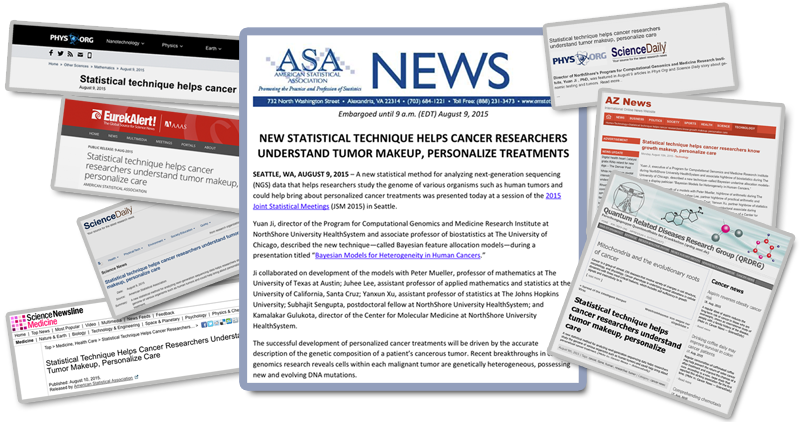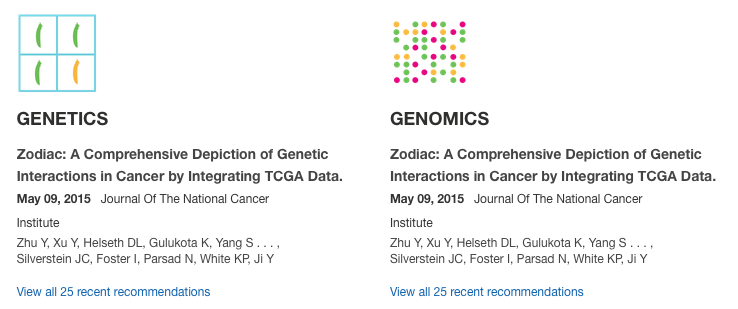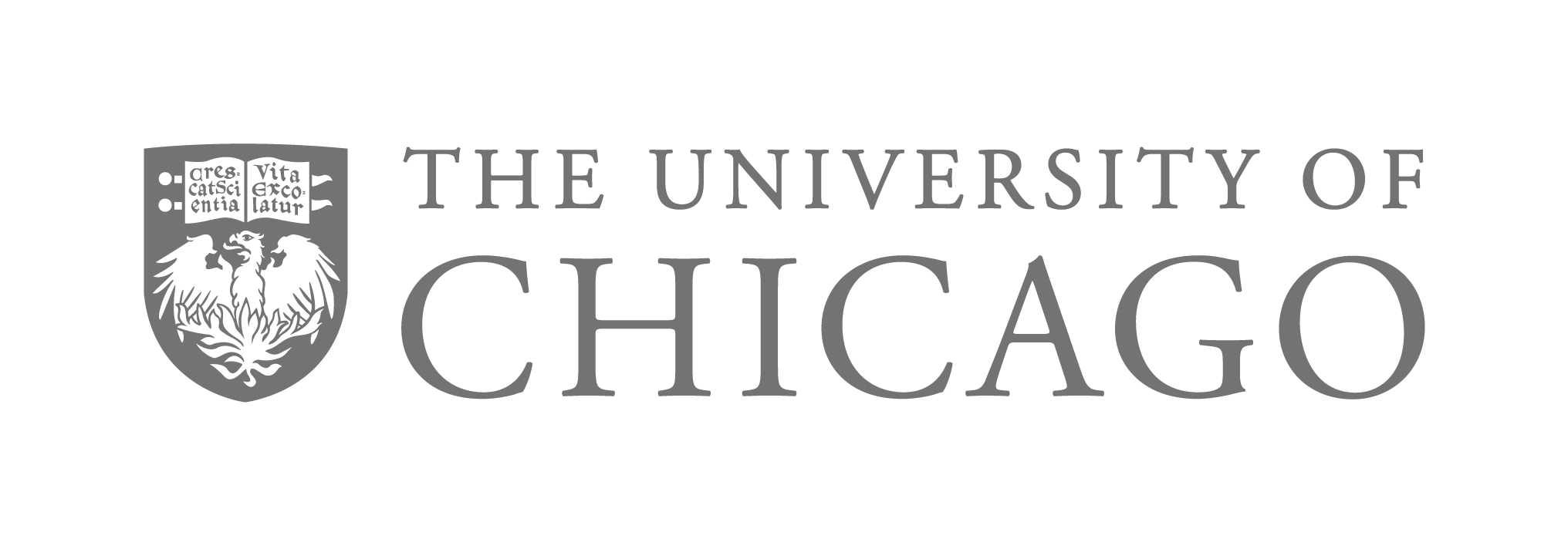We work on big data driven discovery in cancer biology, Bayesian adaptive designs to empower precision medicine, and innovative computational approaches for cancer diagnosis and prognosis based on tumor heterogeneity. We analyze multi-omics data generated from next-generation sequencing platform. Our group (PI: Dr. Yuan Ji) consists of scientists with diverse background ranging across cancer biology, clinical trials, computational biology and bioinformatics, and statistics.
- Congratulation to Dehua on winning the Third Place Award of JSM Student Paper Competition from the ASA Biopharmaceutical Sections for the paper "PAM-HC: A Bayesian Nonparametric Construction of Hybrid Control for Randomized Clinical Trials Using External Data", joint work with Tianjian Zhou and Wei Zhong. Congratulations Dehua! 2024
- Congratulation to Yitan for the paper "Prediction of Chronic Kidney Disease Progression Using Recurrent Neural Network and Electronic Health Records", joint work with Dehua Bi, Milda Saunders, and Yuan Ji. It has been accepted for publication in Scientific reports. 2023
- Congratulation to Dehua for the paper "BEATS: Bayesian Hybrid Design with Flexible Sample Size Adaptation for Time-To-Event Endpoints", joint work with Meizi Liu, Racheal Liu, and Jianchang Lin. It has been accepted for publication in Statistics in Medicine. 2023
- Congratulation to Dehua on getting the thrid place price of the student poster competition award for ICSA Midwest Chapter and NIC-ASA Joint Fall Conference. Congratulations Dehua! 2023
- Congratulation to Dehua on getting the Charles B.Sampson Memorial student poster award for 46th Midwest Biopharmaceutical Statistics Workshop. Congratulations Dehua! 2023
- Congratulation to Dehua on getting the student poster recognitiion award for ASA Biopharmaceutical Section Regulatory-Industry Statistics Workshop. Congratulations Dehua! 2021 more
|
Past Lab Members
|
|
BESS is a sample size estimator under Bayesian framework with an application to oncology dose optimization clinical trials. It is built upon three pillars, Sample size, Evidence from observed data, and Confidence in posterior inference, and uses simple logic of "given the evidence from data, a specific sample size can achieve a degree of confidence in the posterior inference.". The key distinction between BESS and standard sample size estimation (SSE) is that SSE, typically based on Frequentist inference, specifies the true parameters values in its calculation while BESS assumes possible outcome from the observed data. As a result, the calibration of the sample size is not based on Type I or Type II error rates, but on posterior probabilities. |
The Project Optimus initiative by the FDA's Oncology Center of Excellence is widely viewed as a groundbreaking effort to change the status quo of conventional dose-finding strategies in oncology. Unlike in other therapeutic areas where multiple doses are evaluated thoroughly in dose ranging studies, early-phase oncology dose-finding studies are characterized by the practice of identifying a single dose, such as the maximum tolerated dose (MTD) or the recommended phase 2 dose (RP2D). Following the spirit of Project Optimus, we propose an Multi-Arm Two-Stage (MATS) design for proof-of-concept (PoC) and dose optimization that allows the evaluation of two selected doses from a dose-escalation trial. The design assesses the higher dose first across multiple indications in the first stage, and adaptively enters the second stage for an indication if the higher dose exhibits promising anti-tumor activities. In the second stage, a randomized comparison between the higher and lower doses is conducted to achieve PoC and dose optimization. A Bayesian hierarchical model governs the statistical inference and decision making by borrowing information across doses, indications, and stages. Our simulation studies show that the proposed MATS design yield desirable performance. |
|
NextGen-DF is a web-based statistical tool for designing phase I dose-finding trials in oncology. It assumes that a fixed number of doses is predetermined and allows users to evaluate three designs by running computer simulations. The three methods are the 3+3 design, the CRM design, and the mTPI design. NextGen-DF provides mTPI designs (Ji et al., 2007, 2010; Ji and Wang, 2013) as the main recommended method, and as it has been shown to be safer and more efficient than 3+3, and more intuitive and less burdensome than CRM. NextGen-DF is divided into three main components as show in the menu bar: DECISION, SIMULATION, COMPARISON. |
The traditional rule-based design, 3 + 3, has been shown to be less likely to achieve the objectives of dose-finding trials when compared with model-based designs. We propose a new rule-based design called i3 + 3, which is based on simple but more advanced rules that account for the variabilities in the observed data. We compare the operating characteristics for the proposed i3 + 3 design with other popular phase I designs by simulation. The i3 + 3 design is far superior than the 3 + 3 design in trial safety and the ability to identify the true MTD. Compared with model-based phase I designs, i3 + 3 also demonstrates comparable performances. |
|
We propose the Plaid Atoms Model (PAM), a novel Bayesian nonparametric model for grouped data. Founded on an idea of `atom skipping', PAM is part of a well-established category of models that generate dependent random distributions and clusters across multiple groups. Atom skipping referrs to stochastically assigning 0 weights to atoms in an infinite mixture. Deploying atom skipping across groups, PAM produces a dependent clustering pattern with overlapping and non-overlapping clusters across groups. As a result, interpretable posterior inference is possible such as reporting the posterior probability of a cluster being exclusive to a single group or shared among a subset of groups. We discuss the theoretical properties of the proposed and related models. Minor extensions of the proposed model for multivariate or count data are presented. Simulation studies and applications using real-world datasets illustrate the performance of the new models with comparison to existing models. |
It is highly desirable to borrow information from external data to augment a control arm in a randomized clinical trial, especially in settings where the sample size for the control arm is limited. However, a main challenge in borrowing information from external data is to accommodate potential heterogeneous subpopulations across the external and trial data. We apply a Bayesian nonparametric model called Plaid Atoms Model (PAM) to identify overlapping and unique subpopulations across datasets, with which we restrict the information borrowing to the common subpopulations. This forms a hybrid control (HC) that leads to more precise estimation of treatment effects Simulation studies demonstrate the robustness of the new method, and an application to an Atopic Dermatitis dataset shows improved treatment effect estimation. |
|
We introduce a Bayesian hybrid design with flexible sample size adaptation (BEATS) that allows for adaptive borrowing of external data based on the level of heterogeneity to augment the control arm during both the design and interim analysis stages. Initially, BEATS calibrates the expected sample size and initial randomization ratio based on heterogeneity among the external data. During the interim analysis, flexible sample size adaptation is performed to address conflicts between the concurrent and historical control, while also conducting futility analysis. At the final analysis, estimation is provided by incorporating the calibrated amount of external data. Therefore, our proposed design allows for an approximation of an ideal randomized controlled trial with an equal randomization ratio while controlling the size of the concurrent control to benefit patients and accelerate drug development. BEATS also offers optimal power and robust estimation through flexible sample size adaptation when conflicts arise between the concurrent control and external data. |
|
TCGA-Assembler is an open-source, freely available tool that automatically downloads, assembles, and processes public The Cancer Genome Atlas (TCGA) data, to facilitate downstream data analysis by relieving investigators from the burdens of data preparation. TCGA-Assembler includes two modules. Module A acquires public TCGA data from TCGA Data Coordinating Center and assembles individual data files into locally stored data tables. Module B does various manipulations on the data tables to prepare them for downstream analysis. |
Tumor cell population is a mixture of heterogeneous cell subpopulations, known as subclones. Identification of clonal status of mutations, i.e., whether a mutation occurs in all tumor cells or in a subset of tumor cells, is crucial for understanding tumor progression and developing personalized treatment strategies. We make three major contributions in this paper: (1) we summarize terminologies in the literature based on a unified mathematical representation of subclones; (2) we develop a simulation algorithm to generate hypothetical sequencing data that are akin to real data; and (3) we present an ultra-fast computational method, Mutstats, to infer clonal status of somatic mutations from sequencing data of tumors. The inference is based on a Gaussian mixture model for mutation multiplicities. To validate Mutstats, we evaluate its performance on simulated datasets as well as two breast carcinoma samples from The Cancer Genome Atlas project. |
|
We introduce local haplotype variants (LHVs) and a computational pipeline, LocHap, for calling LHVs. An LHV refers to a haplotype that manifests more than two alleles in a single human sam- ple and consists of multiple proximal single nucleotide variants (SNVs). Since humans are diploid, having more than two alleles implies somatic mosaicism. i.e., cells are genetically heterogeneous in the sample due to somatic mutations. Using deep DNA-Seq data, we demonstrate by direct observa- tions and rigorous statistical inference the existence of wide spread LHVs in human normal tissues and tumors, with higher frequencies of LHVs observed in tumor samples compared to normal, and older healthy individuals compared to younger healthy individuals. LocHap is ultrafast, open-source, and freely available at http://www.compgenome.org/lochap. Recognition of the existence of LHVs in normal and disease samples could fundamentally change our practice in disease diagnosis, association, and prognosis. |
For a heterogeneous sample with subclones, DNA nucleotide sequences and copy numbers can differ on multiple loci between subclones. To accurately estimate the number of subclonal variant allele, we must account for subclonal copy numbers. To our knowledge, there are no existing tools for jointly calling subclonal copy numbers and the corresponding variant allele fractions for the same loci. Most methods either call one of the two features while ignoring the other, or assume that one is known and call the other. The proposed method, BayClone2 (as an extension of BayClone (Sengupta et al., 2015)) provides a Bayesian solution using next-generation sequencing (NGS) data for joint inference on both, structure and sequencing variants within a subclone. In addition, BayClone2 estimates the number and cellular fractions of the subclones in the sample, thus providing a complete description of subclonal genetic structure. BayClone2 is implemented as an R package, and the source code is available at http://www.compgenome.org/bayclone2. |
|
We present TreeClone, a latent feature allocation model to reconstruct tumor subclones subject to phylogenetic evolution that mimics tumor evolution. Similar to most current methods, we consider data from next-generation sequencing of tumor DNA. Unlike most methods that use information in short reads mapped to single nucleotide variants (SNVs), we consider subclone phylogeny reconstruction using pairs of two proximal SNVs that can be mapped by the same short reads. As part of the Bayesian inference model, we construct a phylogenetic tree prior. The use of the tree structure in the prior greatly strengthens inference. Only subclones that can be explained by a phylogenetic tree are assigned non-negligible probabilities. The proposed Bayesian framework implies posterior distributions on the number of subclones, their genotypes, cellular proportions, and the phylogenetic tree spanned by the inferred subclones. The proposed method is validated against different sets of simulated and real-world data using single and multiple tumor samples. |
The research of our lab spans across two areas: [1] Bayesian statistical methods, and [2] Bayesian adaptive designs for clinical trials. In particular, we use rigorous and powerful statistical and computational approaches to analyze big and complex genomics and phenotypic data to extract information that can facilitate clinical care of cancer patients. Below is a selected list of papers.
- Liu J, Yuan S, Deng Q, Ji Y. The Modified Combo i3+3 Design for Novel-Novel Combination Dose-Finding Trials in Oncology.
- Duan Y, Yuan S, Ji Y, Müller P. A Unified Decision Framework for Phase I Dose-Finding Designs. Statistics in Biosciences. 1-17, 2023.
- Lyu J, Zhou T, Yuan S, Guo W, Ji Y. MUCE: Bayesian hierarchical modeling for the design and analysis of phase 1b multiple expansion cohort trials. Journal of the Royal Statistical Society Series C: Applied Statistics. 72(3):649-669, 2023.
- Lin X, Lyu J, Yuan S, Bi D, Wang SJ, Ji Y. Bayesian Sample Size Planning Tool for Phase I Dose-Finding Trials. JCO Precision Oncology. 6, e2200046, 2022.
- Li T, Zhou T, Tsui KW, Wei L, Ji Y. Posterior contraction rate of sparse latent feature models with application to proteomics. Statistical Theory and Related Fields. 6(1):29-39, 2022.
- Bi D, Sengupta S, Zhou T, Ji Y. Mutstats: An Ultra-fast Computational Method to Determine Clonal Status of Somatic Mutations. Journal of Data Science. 19(3), 2021.
- Lin X, Ji Y. Probability intervals of toxicity and efficacy design for dose-finding clinical trials in oncology. Statistical Methods in Medical Research. 30(3):843-856, 2021.
- Zanini CTP, Müller P, Ji Y, Quintana FA. A Bayesian random partition model for sequential refinement and coagulation. Biometrics. 75(3):988-999, 9/2019.
- Wei L, Jin Z, Yang S, Xu Y, Zhu Y, Ji Y. TCGA-assembler 2: software pipeline for retrieval and processing of TCGA/CPTAC data. Bioinformatics. 34(9):1615-1617, 5/2018.
- Ni Y, Müller P, Zhu Y, Ji Y. Heterogeneous reciprocal graphical models. Biometrics. 74(2):606-615, 6/2018.
- Zuanetti DA, Müller P, Zhu Y, Yang S, Ji Y. Clustering distributions with the marginalized nested Dirichlet process. Biometrics. 74(2):584-594, 6/2018.
- Ni Y, Müller P, Wei L, Ji Y. Bayesian graphical models for computational network biology. BMC Bioinformatics. 19(Suppl 3):63, 3/2018.
- Lee J, Müller P, Sengupta S, Gulukota K, Ji Y. Bayesian inference for intratumour heterogeneity in mutations and copy number variation. Journal of the Royal Statistical Society Series C: Applied Statistics. 65(4):547-563, 8/2016.
- Lee J, Müller P*, Ji Y, Gulukota K. A Bayesian Feature Allocation Model for Tumor Heterogeneity. Statistical Analysis for High-Dimensional Data: The Abel Symposium 2014 (pp.211-232). Springer International Publishing, 2016
- Mitra R, Müller P, Ji Y. Bayesian graphical models for differential pathways. Bayesian Analysis. 11(1):99-124. 2016.
- Xu Y, Müller P*, Yuan Y, Gulukota K, Ji Y*. MAD Bayes for Tumor Heterogeneity -- Feature Allocation with Exponential Family Sampling. Journal of the American Statistical Association. 110(510):503-514, 3/2015
- Zhu Y, Xu Y, Helseth L, et al., Ji Y*. Zodiac: A Comprehensive Depiction of Genetic Interactions in Cancer by Integrating TCGA Data. Journal of the National Cancer Institute. 107(8), p.djv129, 2015
- Sengupta S, Wang J, Lee J, Müller P, Gulukota K, Banerjee A, Ji Y*. BayClone: Bayesian Nonparametric Inference of Tumor Subclones Using NGS Data. Pacific Symposium on Biocomputing co-chairs (pp. 467-478), 2014.
- Zhu Y, Qiu P, Ji Y*. TCGA-Assembler: Open-Source Software for Retrieving and Processing TCGA Data. Nature Methods. 11(6):399-400, 2014.
- Mitra R, Müller P*, Liang S, Yue L, Ji Y*. A Bayesian Graphical Model for ChIP- Seq Data on Histone Modifications. Journal of American Statistical Association 108: 69-80, 03/2013.
- Lee J, Müller P, Zhu Y, Ji Y*. A nonparametric Bayesian model for local clustering with application to proteomics. Journal of the American Statistical Association. 103(508): 775-788. 1/2013.
- Mitra R, Müller P, Liang S, Xu Y, Ji Y*. Towards Breaking the Histone Code – Bayesian Graphical Models for Histone Modifications. Circulation: Cardiovascular Genetics. 6(4): 419-426, 2013.
- Xu Y, Lee J, Yuan Y, Mitra R, Liang S, Müller P, Ji Y*. Nonparametric Bayesian Bi-Clustering for ChIP-Seq Count Data. Bayesian Analysis. 8(2):1-22, 2013.
- Yuan Y, Norris C, Xu Y, Tsui KW, Ji Y*, Liang H*. BM-Map: an efficient software package for accurately allocating multireads of RNA-seq data. BMC Genomics. 13(Suppl 8):S9. Epub 12/2012.
- Yajima M, Telesca D, Ji Y, Müller P. Differential patterns of interaction and Gaussian graphical models. Biostatistics. 2012.
- Ji Y*, Xu Y, Zhang Q, Tsui KW, Yuan Y, Norris C, Liang S, Liang H*. BM-Map: Bayesian mapping of multireads for next-generation sequencing data. Biometrics. 67(4):1215-24, 12/2011.
- Telesca D*, Müller P, Kornblau S, Suchard MA, Ji Y*. Modeling protein expression and protein signaling pathways. Journal of American Statistical Association, 107(500):1372-1384, 12/2012.
- Baladandayuthapani V, Ji Y, Talluri R, Nieto-Barajas L, Morris J. Bayesian random segmentation models to identify shared copy number aberrations for array CGH data. Journal of the American Statistical Association. 105(492):1358-1375, 12/2010.
- Ji Y, Yin G, Tsui K-W, Kolonin M, Sun J, Arap W, Pasqualini R, Do K-A. Bayesian mixture models for complex high-dimension count data. Journal of the Royal Statistical Society Series C: Applied Statistics. 56(2):139-152, 2007.
- Zhou T, Ji Y. Bayesian Methods for Information Borrowing in Basket Trials: An Overview. Cancers. 16(2):251, 2024.
- Duan Y, Müller P, Ji Y. Comment: Response-Adaptive Randomization in Clinical Trials: From Myths to Practical Considerations. Statistical Science. 38(2):212-215, 2023.
- Ling H, Shi H, Yuan N, Ji Y, Lin X. qTPI: A quasi-toxicity probability interval design for phase I trials with multiple-grade toxicities. Statistical Methods in Medical Research. 09622802231176034, 2023.
- Liu M, Ji Y, Lin J. The Total i3+ 3 (Ti3+ 3) Design for Assessing Multiple Types and Grades of Toxicity in Phase I Trials. The New England Journal of Statistics in Data Science. 1-14, 2022.
- Tsimberidou AM, Müller P, Ji Y. Innovative trial design in precision oncology. Seminars in cancer biology. 84:284-292. 2022.
- Zhou T, Ji Y. Incorporating external data into the analysis of clinical trials via Bayesian additive regression trees. Statistics in Medicine. 40(28):6421-6442, 2021.
- Yuan S, Zhou T, Lin Y, Ji Y. The Ci3+ 3 design for dual-agent combination dose-finding clinical trials. Journal of Biopharmaceutical Statistics. 31(6):745-764, 2021.
- Ji Y, Yuan S. Practical Impact of Modern Dose-Finding Designs When Compared With the 3+ 3 Design: An Editorial. JCO Precision Oncology 5:1584-1587, 2021.
- Duan Y, Wang SJ, Ji Y. Hi3+ 3: A model-assisted dose-finding design borrowing historical data. Contemporary Clinical Trials 109:106437, 2021.
- Liu M, Wang SJ, Ji Y. The i3+3 design for phase I clinical trials. Journal of Biopharmaceutical Statistics. 30(2):294-304, 3/2020.
- Zhou T, Ji Y. RoBoT: a robust Bayesian hypothesis testing method for basket trials. Biostatistics. 2/2020.
- Zhou T, Ji Y. Discussion of "A hybrid phase I-II/III clinical trial design allowing dose re-optimization in phase III" by Andrew G. Chapple and Peter F. Thall. Biometrics. 75(2):385-388, 6/2019.
- Lyu J, Ji Y, Zhao N, Catenacci DVT. AAA: triple adaptive Bayesian designs for the identification of optimal dose combinations in dual-agent dose finding trials. Journal of the Royal Statistical Society Series C: Applied Statistics. 68(2):385-410, 2/2019.
- Guo W, Ji Y, Li D. R-TPI: rolling toxicity probability interval design to shorten the duration and maintain safety of phase I trials. Journal of Biopharmaceutical Statistics. 29(3):411-424, 2019.
- Simon KC, Tideman S, Hillman L, Lai R, Jathar R, Ji Y, Bergman-Bock S, Castle J, Franada T, Freedom T, Marcus R, Mark A, Meyers S, Rubin S, Semenov I, Yucus C, Pham A, Garduno L, Szela M, Frigerio R, Maraganore DM. Design and implementation of pragmatic clinical trials using the electronic medical record and an adaptive design. JAMIA Open. 1(1):99-106, 7/2018.
- Guo W, Wang SJ, Yang S, Lynn H, Ji Y. A Bayesian interval dose-finding design addressingOckham's razor: mTPI-2. Contemporary Clinical Trials. 58:23-33, 7/2017.
- Guo W, Ji Y, Catenacci DVT. A subgroup cluster-based Bayesian adaptive design for precision medicine. Biometrics. 73(2):367-377, 6/2017.
- Li DH, Whitmore JB, Guo W, Ji Y. Toxicity and Efficacy Probability Interval Design for Phase I Adoptive Cell Therapy Dose-Finding Clinical Trials. Clinical Cancer Research. 23(1):13-20, 1/2017.
- Xu Y, Trippa L, Müller P, Ji Y. Subgroup-Based Adaptive (SUBA) Designs for Multi-Arm Biomarker Trials. Statistics in Biosciences. 8(1):159-180, 6/2016.
- Lee JH, Thall PF, Ji Y, Müller P. Bayesian Dose-Finding in Two Treatment Cycles Based on the Joint Utility of Efficacy and Toxicity. Journal of American Statistical Association. 110(510):711-722, 6/2015.
- Pan H, Xie F, Liu P, Xia J*, Ji Y*. A Phase I/II Seamless Dose Escalation/Expansion with Adaptive Randomization Scheme (SEARS). Clinical Trials. 11(1):49-59, 2014.
- Cai C, Yuan Y Ji Y. A Bayesian Dose-finding Design for Oncology Clinical Trials of Combinational Biological Agents. Journal of Royal Statistical Society Series C: Applied Statistics. 63(1): 159-173, 2014.
- Hu B, Bekele BN, Ji Y*. Adaptive dose insertion in early phase clinical trials. Clinical Trials. 10(2):216-224, 2013.
- Ji Y*, Wang S-J. Modified Toxicity Probability Interval Design: A Safer and More Reliable Method than the 3+3 Design for Practical Phase I Trials. Journal of Clinical Oncology. 31(14):1785-91, 2013.
- Ji Y, Liu P, Li Y, Bekele BN. A modified toxicity probability interval method for dose-finding trials. Clinical Trials. 7(6):653-63, 12/2010.
- Ji Y, Bekele BN. Adaptive randomization for multi-arm comparative clinical trials based on joint efficacy/toxicity outcomes. Biometrics. 65(3):876-84, 9/2009.
- Hu B, Ji Y*, Tsui KW. Bayesian estimation of inverse dose-response. Biometrics. 64(4):1223-30, 12/2008.
- Ji Y, Li Y, Yin G. Bayesian Dose Finding in Phase I Clinical Trials Based on a New Statistical Framework. Statistical Sinica. 17:531-47, 2007.
- Congratulation to Dehua on winning the Third Place Award of JSM Student Paper Competition from the ASA Biopharmaceutical Sections for the paper "PAM-HC: A Bayesian Nonparametric Construction of Hybrid Control for Randomized Clinical Trials Using External Data", joint work with Tianjian Zhou and Wei Zhong. Congratulations Dehua! 2024
- Congratulation to Yitan for the paper "Prediction of Chronic Kidney Disease Progression Using Recurrent Neural Network and Electronic Health Records", joint work with Dehua Bi, Milda Saunders, and Yuan Ji. It has been accepted for publication in Scientific reports. 2023
- Congratulation to Dehua for the paper "BEATS: Bayesian Hybrid Design with Flexible Sample Size Adaptation for Time-To-Event Endpoints", joint work with Meizi Liu, Racheal Liu, and Jianchang Lin. It has been accepted for publication in Statistics in Medicine. 2023
- Congratulation to Dehua on getting the thrid place price of the student poster competition award for ICSA Midwest Chapter and NIC-ASA Joint Fall Conference. Congratulations Dehua! 2023
- Congratulation to Dehua on getting the Charles B.Sampson Memorial student poster award for 46th Midwest Biopharmaceutical Statistics Workshop. Congratulations Dehua! 2023
- Congratulation to Dehua on getting the student poster recognitiion award for ASA Biopharmaceutical Section Regulatory-Industry Statistics Workshop. Congratulations Dehua! 2021
- Congratulation to Dehua for the paper "Mutstats: An Ultra-fast Computational Method to Determine Clonal Status of Somatic Mutations", joint work with Subhajit Sengupta, Tianjian Zhou, and Yuan Ji. It has been accepted for publication in Journal of Data Science. 2021
- We have been conducting statistical inference to interpret emerging epidemiological data based on public and open source data of COVID-19 , with the aim to 1) help public raise awareness of the virus outbreak and required self-discipline to fight the outbreak and 2) assist decision makers to make data-driven decisions. While our research works are being produced and submitted for peer-reviewed publications, we take the form of blogging to share preliminary results of our work and convey them in a way that is more accesible to the public. We will also embed our own interpretation and opinion, with the purpose to share and exchange with our readers.
- Congratulation to Yuan on getting elected as the elected fellow of the American Statisical Assocation, 2020. Congratulations to Yuan! Aug 2020
- Congratulation to Daniel on winning the JSM Student Paper Award from the Social Statistics, Government Statistics, and Survey Research Methods Sections of the American Statistical Association for the paper "An Overlooked Bias-Variance Tradeoff for Average Treatment Effects in Multisite Randomized Trials", joint work with Stephen Raudenbush. Congratulations Daniel! 2020
- Congratulation to Meizi on getting the Paul Meier PhD Scholars Award at the University of Chicago. 2019
- Congratulation to Meizi on getting the student travel award for ASA Biopharmaceutical Section Regulatory-Industry Statistics Workshop. Congratulations Meizi! 2019
- Congratulation to Meizi on getting the graduate council travel award at the University of Chicago. 2019
- Congratulation to Tianjian on getting the Savage award (honorable mention) 2018. Congratulations Tianjian! Aug 2018
- Congratulation to Lin Wei for the paper "TCGA-Assembler 2: Software Pipeline for Retrieval and Processing of TCGA/CPTAC Data". It has been accepted for publication in Bioinformatics. Dec 20, 2017
- We have extended our LocHap tool for GBS method. A new paper using this tool got accepted by G3(Genes, Genomic, Genetics). May 2, 2017
- Our mTPI-2 paper is accepted by Contemporary Clinical Trials. Apr 23, 2017
- TCGA-Assember version 2.0.3 has been released. It can now acquire and process TCGA somatic mutation data from the Genomic Data Commons (GDC) and mass spectrometry proteomics data of TCGA samples generated by the Clinical Proteomic Tumor Analysis Consortium (CPTAC). Apr 18, 2017
- TCGA-Assember version 2.0.0 has been released and it is compatible with Genomic Data Commons. Dec 22, 2016
- Congratulations to NextGen-DF breaking 300 registered users. Nov 17, 2016
- Congratulations for our radiogenomics research published in high-level journals, including Scientific Reports, Cancer, Radiology, Journal of Medical Imaging, and NPJ Breast Cancer. May 3, 2016
- SCUBA is now a semi-finalist at the Precision Trial Challenge hosted by Harvard Business School (https://openforum.hbs.org/challenge/precision-medicine/announce-semi-finalists) May 1, 2016
- Mitra R, Mueler P, Ji Y. "Bayesian Multiplicity Control for Graphs" is accepted by Canadian Journal of Statistics. May 1, 2016
- LocHap version 2.0 is released. See details. Feb 15, 2016
- Radiogenomics paper is accepted by Scientific Reports. Congratulations to Yitan! Nov 20, 2015
- NGDF paper is accepted by Contemporary Clinical Trials. Congratulations to Shengjie! Sep 21, 2015
- Congratulation to Tianjian and Subhajit for the paper "A Bayesian Nonparametric Model for Reconstructing Tumor Subclones Based on Mutation Pairs". It has been accepted in the conference Pacific Symposium on Biocomputing (PSB) 2016. Sep 16, 2015
- Congratulation to Subhajit for the paper "Ultra-Fast Local-Haplotype Variant Calling Using Paired-end DNA-Sequencing Data Reveals Somatic Mosaicism in Tumor and Normal Blood Samples". It has been accepted for publication in Nucleic Acids Research. Sep 16, 2015
- Yuan’s talk at JSM is featured in the press release. Aug 09, 2015

- Congratulations to TCGA-Assembler breaking 1,000 registered users. Aug 04, 2015
- We have launched a blog discussing the tools on our website. The first series blog, written by Yuan Ji, is about Zodiac, our big-data cancer genomics database. Jun 04, 2015
- Our Zodiac paper is nominated as the featured recommendation article on PubChase. May 09, 2015

- Zodiac paper is accepted to Journal of the National Cancer Institute. Apr 10, 2015
- We have updated Zodiac with a new landing page that include several exciting discoveries. Also, we have enhanced the user-experience in the gene search by linking NCBI gene description directly to the gene names in the search results. Click here for a screen shot. Apr 01, 2015
- Congratulations to Yanxun who will start her new job as an assistant professor in the Department of Applied Mathematics & Statistics at Johns Hopkins University.
- Congratulations to Subhajit on getting the travel award for PSB 2015. Nov 13, 2014
- "Are normal cells genetically identical" is selected as a big idea and provided initial seed funding by University of Chicago BIG IDEAS GENERATOR. Congratulations to Yuan! Aug 2014
- BayClone paper is accepted to Pacific Symposium on Biocomputing (PSB) 2015 (January 4-8, 2015. The Big Island of Hawaii).
- SUBA paper is accepted to Statistics in Biosciences.
- Two Treatment Cycles paper is accepted to Journal of American Statistical Association.
- SEARS paper is published in Clinical Trials. [Link]
- TCGA-Assembler paper is published in Nature Methods. [Link]
- Abstract for miRNA regulation study in head & neck cancer is accepted by IFHNOS 5th World Congress/AHNS 2014 Annual Meeting.



